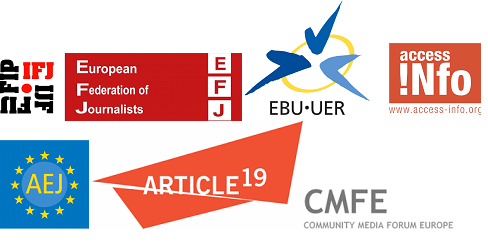
To: Thorbjorn Jagland
General Secretary
Council of Europe
Copy: Secretariat and Members of the CDMSI
Secretariat and Members of CODEXTER
Brussels, 8 February 2012
Concerns: Press Freedom and Anti-Terrorism Laws
Dear Mr Jagland,
We write to you on behalf of the undersigned civil society and professional groups, which are all either observers at the CDMSI or active in the field of press freedom and civil rights in Europe.
In May 2009, Ministers responsible for Media and New Communication Services of the Council of Europe committed in Reykjavik to “review national legislation and/or practice on a regular basis to ensure that any impact of anti-terrorism measures on the right to freedom of expression and information is consistent with Council of Europe standards”. To the best of our knowledge, no country has conducted a review of existing laws and, in spite of calls from civil society, the Council of Europe has not taken [sufficient] steps to encourage member states to conduct such a review. We deeply regret that so far absolutely no progress has been made by member states on the “Reykjavik Declaration” and we call the Council of Europe to remind its member of their commitments. We are also concerned that the failure to take action on this matter sends a signal that it is acceptable to make use of anti-terror legislation to curb freedom of expression. We are particularly alarmed to note since the 2009 Reykjavik commitments there has been a significant increase in the number of journalists and press freedom activists accused of or jailed for alleged terroristic activities in some countries in the Council of Europe region. For civil society it therefore remains a matter of priority that there should be a review of the anti-terror laws. To this end, we have regularly reiterated our call, for example in the Declaration on Journalism in the Shadow of Terror Laws adopted by a conference convened by the International/European Federation of Journalists on the 10th anniversary of 11 September. This text adopted by professional groups and media freedom organisations refers to the Reykjavik declaration and makes new, detailed recommendation on how to defend press freedom against anti-terrorism policies.[2]. In your June 2011 letter you stated that a decision had been taken by the CDMC to “provide guidance to member states, possibly in the form of a Committee of Ministers’ recommendation, for the review of their anti-terrorism legislation and practice.” Not only did this not happen, but it is with great disappointment that we have learned that responsibility for oversight of the Reykjavik commitments has now been removed from the remit of the CDMSI and shifted to the Committee of Experts on Terrorism, CODEXTER, which deals strictly with state security and anti-terrorism measures. Whilst we understand the logic of bringing in the expertise of CODEXTER and calling on their assistance for any possible review of anti-terror laws, we strongly believe that the CDMSI which is charged with promoting and protecting media freedom should continue to be involved. Furthermore, the Reykjavik commitment was made under the auspices of the Conference of Ministers responsible for Media and New Communication Services and it is to this body that a report should be presented when it next meets, in Belgrade (Serbia) in 2013. For this reason, we formally ask that Press Freedom and Anti-Terrorism Laws and the follow-up of the Reykjavik Declaration should continue to be an agenda item for the CDMSI and should be put on the agenda of the 2013 Belgrade Ministerial Conference. We thank you for the serious consideration that you will give to this letter. Yours Sincerely, Arne König, EFJ President À title personnel [1] Developments in anti-terrorism legislation in Council of Europe member states and their impact on freedom of expression and information, MCM(2009)011 [2] http://europe.ifj.org/en/articles/declaration-adopted-by-ifj-efj-conference-on-journalism-in-the-shadow-of-terror-laws
Helen Darbishire, Access Info Europe
William Horsley, Media Freedom Representative, Association of European Journalists
Agnès Callamard, Executive Director, Article XIX
Pieter de Wit, President, Community Media Forum Europe
Michael Wagner, Deputy Director of Legal Department, European Broadcasting Union
Francesco Diasio, AMARC Europe
Osman Gunduz, Azerbaijan Internet Forum
Venkatesh Nayak, Commonwealth Human Rights Initiative
Sandor Orban, South East European Network for Professionalization of the Media
Ioana Advani, Center for Independent Journalism (Romania)
Klime Babunski, PRO MEDIA, Macedonia
Andrei Soldatov, Agentura.Ru
Staffan Dahllöf, co-editor Wobbing Europe
Brankica Petkovic, Peace Institute, Ljubljana
Galina Arapova, Mass Media Defence Centre
Ronald Koven, World Press Freedom Committee
Tom Hetland, International Press Institute Norway
Toby Mendel, Centre for Law and Democracy
Jon Silverman, Professor, Media & Criminal Justice and ex-BBC Home Affairs Correspondent
Dirk Voorhoof, Ghent University / Copenhagen University, Legal Human Academy
Bill Bowring, Professor of Law at Birkbeck College, University of London
Nico van Eijk, Institute for Information Law (IViR, University of Amsterdam).

